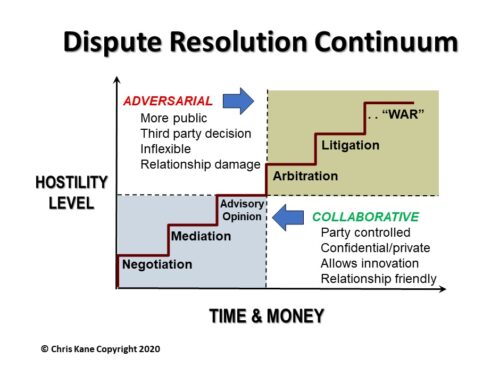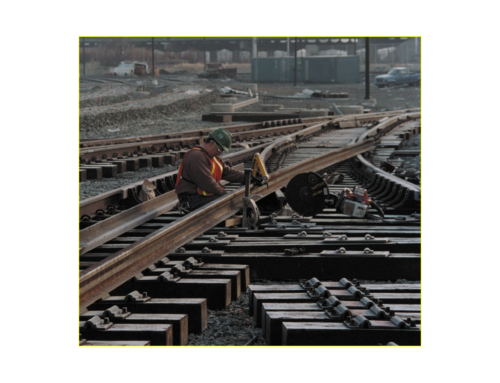Preparation is the key to success in any mediation, as it is in most of life endeavors. In this time of virtual mediation and “zooming” to settle disputes, the preparation phase is even more critical than normal times. The first mediation I conducted with Zoom, involved a design-build school project significantly delayed and still under construction when the mediation started. The contract was in danger of imminent termination. With a termination for default, the project enters into an expensive, drawn out, adjudicatory process, where the amount at stake escalates dramatically and chances of early settlement seriously diminish.
Keeping everyone engaged is key. Despite the high emotions, the mediator’s suggestion on the first call got everyone’s attention focused on keeping the contract in place. To the credit of the lawyers representing the parties, on the second phone call, an interim agreement for discrete payments to complete some final work tasks was reached. This overcame the potential termination stumbling block and the interim agreement itself became a building block. Everyone then cautiously became locked into a process to solve the problem of a million claim.
All mediations are different – but for this one, extensive preparation and early engagement made the difference. With the video conferencing, these preparation phone calls now become more engaging as “face to face” meetings. Once we all became comfortable with Zoom, I found that the amount of quality time in virtual meetings with the parties individually preparing for the mediation, was as much as the time actually spent in the mediation session. Preparation time well spent.
Suggestions for Mediation Preparation. In the context of a construction or environmental mediation, here are some useful suggestions in preparing for a mediation:
- BUILD RELATIONSHIPS WITH COUNSEL IMMEDIATELY. Lawyers are typically in the mediation mode because the contract called for it. The enlightened construction lawyer knows this process can help their clients maintain relationships and to get a timely, cost effective resolution to the matter. Regardless of this enlightenment, when the mediator gets on the first phone call, party counsel’s patience often might be in short supply, and posturing can be in over supply. If not checked, this combination can get things moving in a bad direction. I find it helps to let the lawyers have a conversation about their positions for me (and the other side) to hear, and get their feedback on my guidance on how the process can be structured for the mediation to succeed.
- MAKE CERTAIN ALL CLAIMS ARE DEVELOPED AND UNDERSTOOD. If the mediation occurs prior to, or early in litigation, claims are often not very well developed. All claims and counterclaims need to be developed in some detail, especially if there are technical aspects to the dispute. Information must be exchanged well ahead of time to give the other party an opportunity to understand the claims and respond. This claim development will benefit by encouraging claim modifications to narrow the gap before mediation memos are exchanged and when you finally start the actual mediation. If experts are involved, techniques for “hot tubbing” experts might be employed prior to the mediation to further narrow issues.
- ESTABLISH THE MEDIATOR’S RELATIONSHIPS WITH THE PARTY REPS. The mediator should speak individually more than once with counsel and their party reps before the mediation session. These separate meetings should include: an early discussion of the mediation process; after detailed claims are exchanged, a call to understand what’s claimed; and a call after the mediation memos are exchanged to understand prior settlement discussions and best & worse case outcomes. This is important to build rapport, to review and fully understand the positions and interests of each side and to start the process of movement. It is critical for the mediator to speak directly with the actual parties before the mediation to establish and build trust.
- THE MEDIATOR NEEDS TO DEMONSTRATE DETERMINATION. I try to always prepare for mediation, as if this case is the most important case in the world and that it is imperative to get it settled. I do so even when, as is often the case: a court mandated the case be mediated; parties don’t believe mediation will work; parties really don’t want to take the time to prepare; or neither side seems willing to make any significant compromise. Often lawyers put on a great front about their pessimism about settlement, intransigence on giving much in compromise, and the true strength (or lack of weakness) of their case. All of these theatrics needs to be teased out during the pre-mediation preparation.
As one very experienced litigator friend told me, the main quality he wants in a mediator is “fire in the belly”. That fire needs to start slowly during the mediation preparation phase, and continue building to closure, when we get the parties to reach agreement. The best feedback a mediator can hear from the parties or counsel at the end of a mediation, is “I never thought this one would settle”. This turn around begins with the mediator’s determination and good preparation.
by Chris Kane




